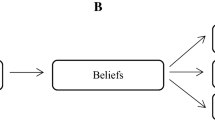Abstract
Forgiving, long encouraged by practitioners of Rational Emotive Behavior Therapy (REBT), is shown to be an elegant antidote to anger requiring recognition of two things. First, what happened was bad, or wrong. Second, the author of the bad or wrong occurrence is responsible for having done it. After reviewing some basic REBT points, an analysis of self-forgiveness underlines the importance of receiving as well as issuing forgiveness and the relationship of forgiving to depression and guilt. The importance of reconciling when forgiving self, the world-in-general and, for believers, omnipresent supernatural beings is presented. Reconciliation as finding enjoyment with that which also blocks, or has blocked, the fulfillment of our desires is also discussed.
Similar content being viewed by others
References
Alberti R. E., Emmons M. L., (1970). Your perfect right: A guide to assertive behavior. San Luis Obisipo, CA: Impact Press
DiGiuseppe, R. (1999). Assessment, diagnosis and treatment of clients with anger problems. Produced by Lima Associates. 8353 Mentor Ave, Mentor, OH 44060
DiGiuseppe R., Tafrate R., (2006). Understanding anger and anger disorders. Oxford University Press, New York
Dryden W., DiGiuseppe R., (1990). A Primer on rational-emotive therapy. Research Press, Champaign, Illinois
Ellis A., (1962). Reason and emotion in psychotherapy. Secaucus. Citadel Press, Secaucus, New Jersey
Ellis A., Dryden W., (1987). The practice of rational-emotive therapy (RET). Springer Publishing Company, New York
Enright R. D., (2001). Forgiveness is a choice: A step-by-step process for resolving anger and restoring hope. American Psychological Association, Washington, D.C
Enright R. D., Fitzgibbons R. P., (2000). Helping clients forgive: An empirical guide for resolving anger and restoring hope American Psychological Association, Washington, D.C
McCullough M. E., Hoyt W. T., Rachael K. C., (2000). What we know (and need to know) abut assessing forgiveness constructs. In: McCullough M. E., Pargament K. I., Thoresen C. E. (eds), Forgiveness theory, research and practice. Guilford Press, New York, pp. 65–90
McCullough, M.E., Pargament, K.I., & Thoresen, C.E. (Eds.) (2000). Forgiveness theory, research and practice. New York: Guilford Press
McCullough M. E., Pargament K. I., Thoresen C. E., (2000). The psychology of forgiveness: history, conceptual issues and overview In: McCullough M. E., Pargament K. I., Thoresen C. E. (eds), Forgiveness theory, research and practice. Guilford Press, New York, pp. 1–16
McCullough M. E., Witvliet V. O., (2002). The psychology of forgiveness In: Snyder C. R., Lopez S. J., (eds), Handbook of Positive Psychology. Oxford University Press, London, pp. 446–458
Robb H. B. III. (1992). Why you don’t have a “perfect right” to anything. Journal of Rational-Emotive & Cognitive-Behavior Therapy 10(4): 259–270
The no cop-out therapy. Psychology Today, 7(2), 56–62. (Reprinted, New York: Albert Ellis Institute.)
Acknowledgments
The author thanks Dr. Ricks Warren and two anonymous reviewers for their comments on this paper.
Author information
Authors and Affiliations
Corresponding author
Additional information
Earlier versions of this paper were presented at the annual conventions of the American Psychological Association, August 2000 and the Association for the Advancement of Behavior Therapy, November 2000.
Rights and permissions
About this article
Cite this article
Robb , H.B. Treating Anger with forgiveness may sometimes require Reconciliation. J Rat-Emo Cognitive-Behav Ther 25, 65–75 (2007). https://doi.org/10.1007/s10942-006-0030-5
Published:
Issue Date:
DOI: https://doi.org/10.1007/s10942-006-0030-5




